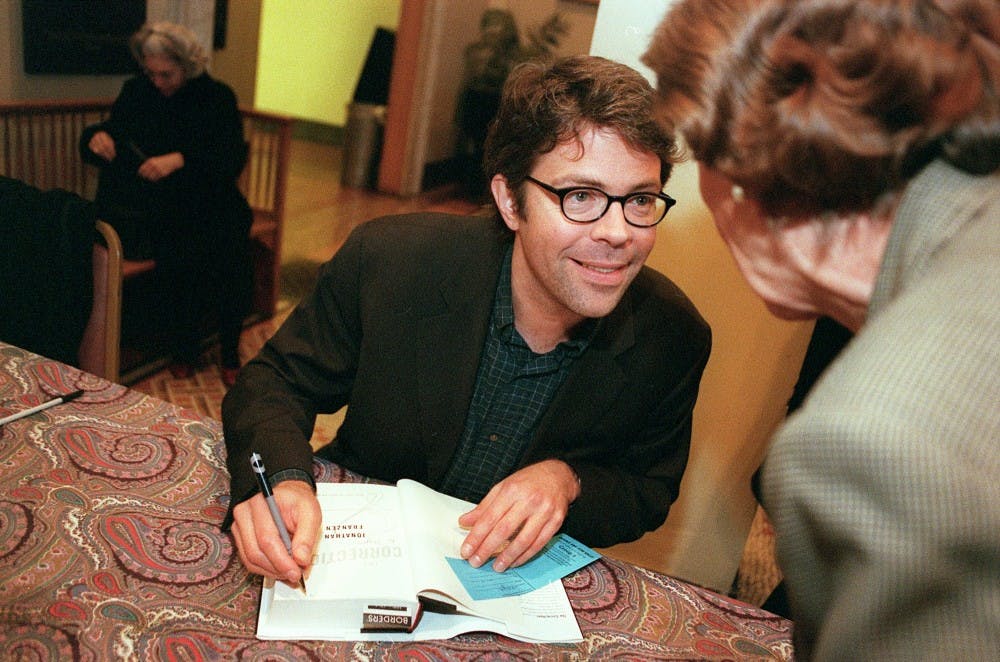An anecdote: Jonathan Franzen was at a party one night for the release of his novel "Freedom" and was enjoying himself. When two men approached him, one snatched his glasses off of his face and the other handed him a ransom note then disappeared into the night, the author was shocked.
He looked at the note: The ransomers demanded a sum of $100,000 for the return of his glasses. After the police dispatched a search helicopter Franzen's ransomer was apprehended in a bush. The glasses were returned to the author unharmed.
Franzen is notorious in the public eye. He's been invited to the Oprah show twice and uninvited once. He was on the cover of Time magazine. It's difficult for an author to become famous in America, but somehow Franzen has ascended to the throne of the quasi-king of popular books.
This of course begs the question, is Franzen a good author? A good artist? How does he explore and challenge his medium? Why is he so popular?
Jonathan Franzen in LA, reading from "Purity" and answering questions pic.twitter.com/QJA6PWi2sY
— L.A. Times Books (@latimesbooks) September 13, 2015
Before this, I had read Franzen's 2001 book, "The Corrections," so I have something of an idea of Franzen's growth over the last decade. I have a semblance of knowledge regarding what he has embraced in his craft, what he has discarded, what's common and what is genuinely Franzen.
First, I think it's important to distinguish what Franzen is not. Franzen is not an experimental writer. He is not part of the avant-garde. "Purity" is clearly descended from the traditional novel and does not experiment with form or structure. He does not try to innovate the medium; he is completely content to work inside of it. "Purity" is the type of novel that adopts the basic form of the medium that has not changed much since Dickens' time.
Considering this, "Purity" is a really good traditional novel. It's good to be challenged by an author when you read a book and it is good when the author challenges the form, however the challenge from "Purity" comes from its subject matter instead of its play with form.
Purity Tyler, who goes by Pip, is a recent college graduate who is living with four roommates in what is basically a halfway house. She lacks any real direction in life and her biggest daily struggles are phone conversations with her emotionally unstable mother. Her only real ambition is to find her father who she has never met. This search is the propelling force of the book's plot.
Along the way, Pip encounters a diverse array of characters. Creating intricate characters is definitely one of Franzen's strong suits.
The book has received some notoriety for its portrayal of feminism, which is one of its major themes. The character Leila is an investigative journalist who is also caught between two men; her husband, Charles, who is a washed-up novelist and her boyfriend, Tom, who is the head of the news organization she works for. Some nights she spends with Charles who is bound in a wheelchair and other nights she spends with her lover, Tom. The conflict for Leila is a major turn of the plot.
The book is also very funny. The humor is mostly situational and relies heavily on Franzen's characterizations so it's difficult to capture in excerpts, however, this exchange between the obtuse middle-aged novelist Charles and naive Pip Tyler might help show what I mean:
"'Are you a reader Pip? Do you read books? Is the sight of so many books in one room frightening to you?'
'I like books.' Pip said.
'Good. Good.'..."
So for a book of nearly 600 pages in a world ruled by low attention spans and the limitless amusement of Twitter and Facebook, the overwhelming question is, is it worth reading?
The short answer is yes. The long answer is this review.
Related links:
Hush Baby Collective to release feminist zine on mental health awareness
Mira Gonzales is Alt Lit's sweetheart
Reach the reporter at lsaether@asu.edu or follow him on twitter at @looooogaaan.
Like The State Press on Facebook and follow @statepress on Twitter.




